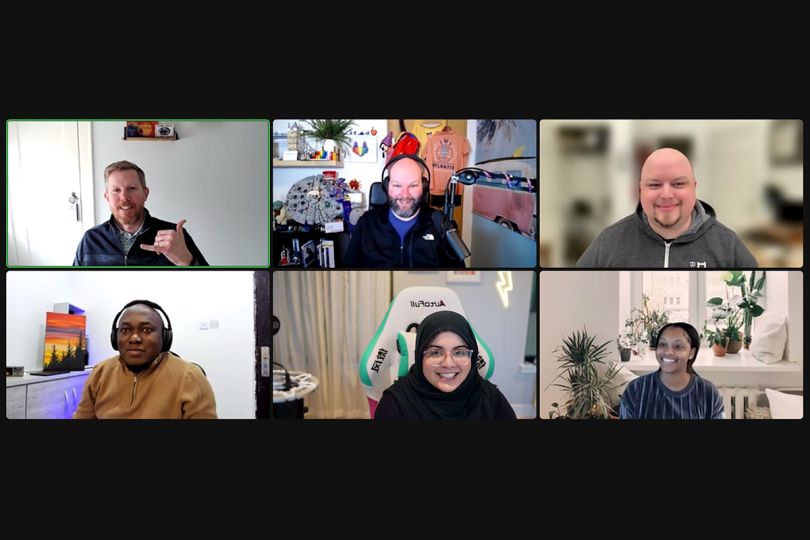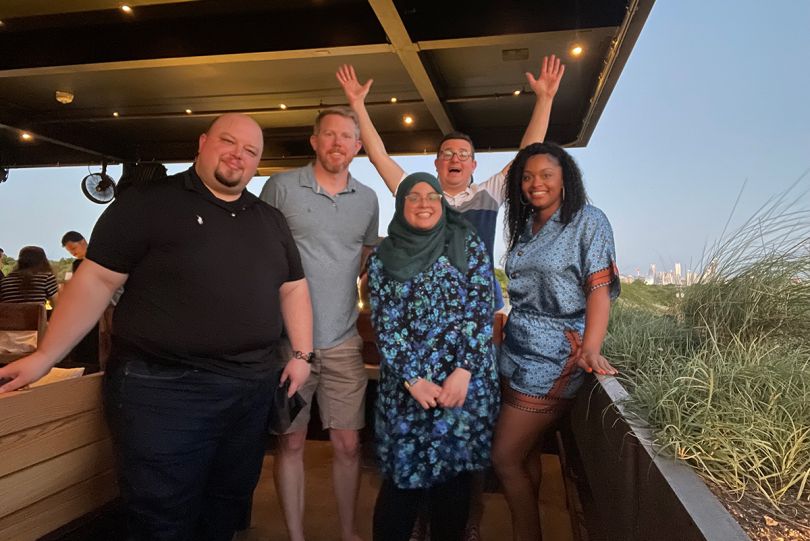Ever since it was founded as an open-source project in 2011, GitLab has welcomed the expertise and feedback of users — who are developers themselves — from around the globe. The result? Its DevOps platform has evolved rapidly while the company has gone public and grown a dedicated following of more than 30 million registered users.
The platform’s strength is directly tied to the strength of its community, which is fostered by a passion for collaboration.
“We still have that same open-source culture with many of our users, who are now paying customers,” said Steve Xu, a mid-market area sales manager. “A lot of the product innovations and features that we’ve released have actually come from the community.”
GitLab’s roots in working with a global network of developers has made internal collaboration amongst its remote workforce second nature. While asynchronous work is the default, GitLab’s employees are empowered to contribute to the product and company by offering suggestions and jump-starting initiatives, without needing to ask permission or wait until their idea is perfect.
“One of our values centers on iteration, which contributes to our belief that not everything is going to be perfect — and that’s OK,” said Vice President of Diversity, Inclusion and Belonging Sherida McMullan. “We have the ability to fail forward, and we can shed the feeling of needing to be perfect. We all have the opportunity to contribute, even if we don’t get it right or make a mistake. In that process, you learn.”
“We all have the opportunity to contribute, even if we don’t get it right or make a mistake. In that process, you learn.”
For Developer Evangelist Fatima Sarah Khalid, this supportive culture has enabled her to grow her confidence in bringing forth new solutions, and has set her up for tangible career growth.
“I have a lot of autonomy in my role,” Khalid said. “If I can prove the data behind something that I want to do, I'll be encouraged to do it. It’s really empowering to be at a company that supports you in building what you find impactful and what you’re passionate about, especially as you’re growing in your career.”
To find out more about what collaboration looks like at GitLab, Built In connected with Xu, McMullan and Khalid. Together, they spoke to why transparency, inclusivity and a steadfast belief in trying something new has allowed them to grow as professionals — and, more importantly, as humans.

What does collaboration look like in your role?
Mid-Market Area Sales Manager Steve Xu: Collaboration has always been the way we get results. For example, when GitLab launches marketing campaigns, we work with marketing, sales development and product teams, which I had never done prior to working here. It’s really cool to get to work so closely with these cross-functional teams. If we have a customer problem, we can actually work directly with the support team to help the customer. Everyone here is willing to help each other, and because we’re not in the same physical location, we’re very approachable and quick to respond to one another.
Vice President of Diversity, Inclusion and Belonging Sherida McMullan: Diversity, inclusion and belonging work can sometimes be siloed. But here, I’m able to collaborate with people across the entire company, whether that’s with my team, business partners, data analytics, recruiting or talent acquisition functions. For example, I could ask Steve questions like, “What actions do we need to take to address inclusion and belonging from a diversity perspective? What actions can we take to really impact what we’re doing within the sales division?”
How do you collaborate with GitLab’s users?
Developer Evangelist Fatima Sarah Khalid: I manage our community forums, which are official spaces where people come to for questions and discussions, as well as our subreddit and our StackOverflow clusters. Everywhere our community aggregates over the internet is my playground, and allows me to see what users are talking about and how we can support them.
I’ll see the same names every day answering questions across forums, or providing snippets of code. It’s really amazing to me that the community is so passionate and finds value in contributing, whether that’s supporting others with issues they’re having, or contributing to new features. It’s infectious to see, and makes the work I do feel really impactful.
McMullan: Recently, I was able to attend my first industry event, called Dev Color In Motion, which is geared toward Black developers. It was overwhelming to see how respected GitLab is in the community. These types of events are places where we can meet people who are actively contributing to our platform, and potentially bring them in as talent on the GitLab team. It was amazing to just see the brand recognition that we have. It’s not just about people saying they’ve heard of us, but they’ve actually contributed to the platform. To me, that speaks volumes. It also gives us an opportunity to reach talent beyond the typical ways of recruiting.
By the book
Why is the handbook, and the public forum around it, important to you?
Xu: Even before we were a public company, we’ve always lived by our handbook. A lot of that had to do with the fact that we’ve always been remote, and the handbook is one of the quickest ways to contribute to the company, get the word out to our employees and ensure we have a formal process.
The handbook has always been a North Star for us. If someone feels passionate about making a change, they can submit their idea and eventually see it become incorporated into the handbook. We have a term, “handbook official,” that means a new idea or iteration has been approved and we’ll use that process moving forward.
McMullan: The handbook is one of the things about GitLab that I love. When I sit in on interviews, sometimes a potential candidate will deep dive into an area of our diversity, inclusion and belonging plan that’s in our handbook. That gives me the ability to learn and understand if there’s something we need to address or tweak. I chose this company because I knew I would have the opportunity to contribute as a subject-matter expert, and increase my own learning.
What makes you feel empowered to contribute to your team, or to GitLab as a whole?
Khalid: When it comes to collaborating or adding a suggestion to the handbook, it doesn’t have to be perfect. I really struggled with that concept when I first joined the company, because I came from organizations where you didn’t share your drafts because it wasn’t polished work. Here, you can share your drafts and nobody is going to knock your credibility — we all understand drafts are drafts.
Saying that is one thing, but I see it in action. For example, the first time I felt like a page wasn’t updated, my manager told me just to open a merge request and edit it. I wasn’t sure how to just jump in and start editing a page that I’m not responsible for, so for the first month, my manager would get on a call with me and we’d do it together. I keep a Post-It note on my desk that says, “Be confident!” because if I see something that needs to be changed, it’s a reminder that I can just jump in and change it.
Xu: For the three years I’ve been here, I’ve felt continuously more empowered to contribute, and feel safe in doing so. It starts with us having great leadership, from the CEO down. We have these all-hands calls, where anyone can ask our CEO questions. We also have weekly AMA, or ask-me-anything, sessions. That kind of transparency allows us to understand and contribute right away to what leadership is thinking about.
Remote work, real connections

What role does diversity, equity and belonging have in a collaborative workplace?
McMullan: We are focused on leading in a way that makes everyone feel like they can contribute and that we’re building an inclusive environment. When I first started, we had team member resource groups that were very focused on race, gender and even veterans. But it was important to me, in this remote environment, to provide additional groups that allow our team members to feel like they can contribute to a community.
Now, we have groups like Global Voices, where people discuss events happening outside of the United States that are critically important. We also just created a group for caregivers — whether it is for a friend, a family member, a parent or a child, being a caregiver during the pandemic has affected a large number of people.
Our TMRGs are a great way for people to not only collaborate but also have an impact in our divisions.
Xu: We have awesome TMRGs. One of my coworkers started an TMRG called Minorities In Tech, which inspired me to start my own for Asian Pacific Islanders. Those are the little things that help me feel like this is a safe and inclusive workplace. It also inspires me, as a new manager, to start hiring with an inclusive mindset, and ensure that anyone I hire is enabled and empowered to contribute.
How has GitLab’s focus on inclusivity and community impacted you in your role?
Khalid: We do a lot of work at events, and my team is given t-shirts to wear, so people can identify us as GitLab. I don’t really wear t-shirts, due to religious dress code requirements. Before my first event, I mentioned this to my manager, and asked if I could maybe cut our logo out of the t-shirt and wear that as a bandana. He said, “What would be the ideal thing for you to wear to identify as being part of GitLab?” I had to sit with that for a moment, because nobody at any of my previous companies had ever asked me what I would like to wear at an event before. He gave me a budget to explore what worked for me, and just let him know what I decided to go with.
Afterwards, I actually got emotional and called a friend to share that someone at work had accommodated me in a way I’ve never experienced before. For me, that was the personification of the values and policies that we’ve talked about, and showed me how to be an inclusive team member.







